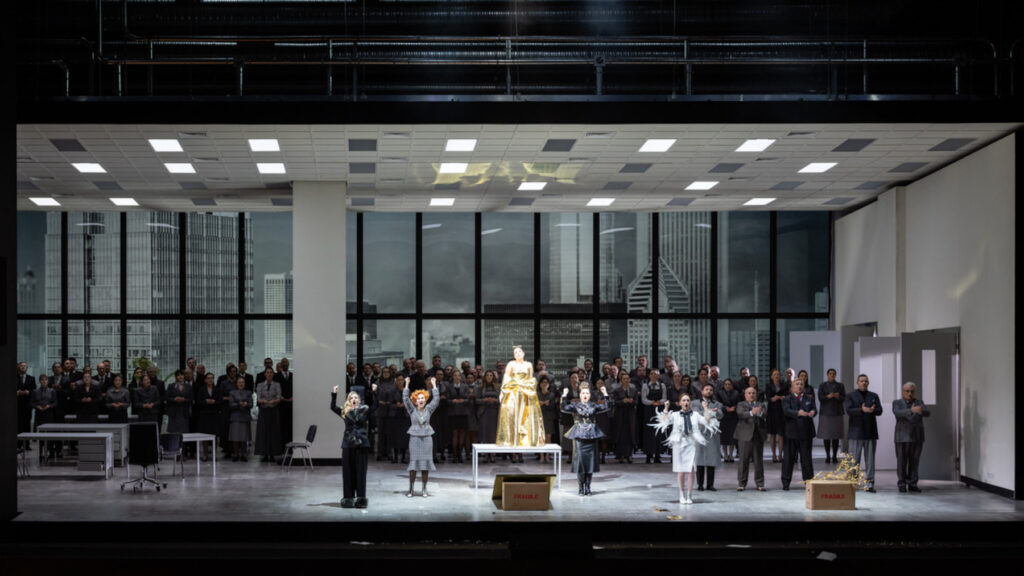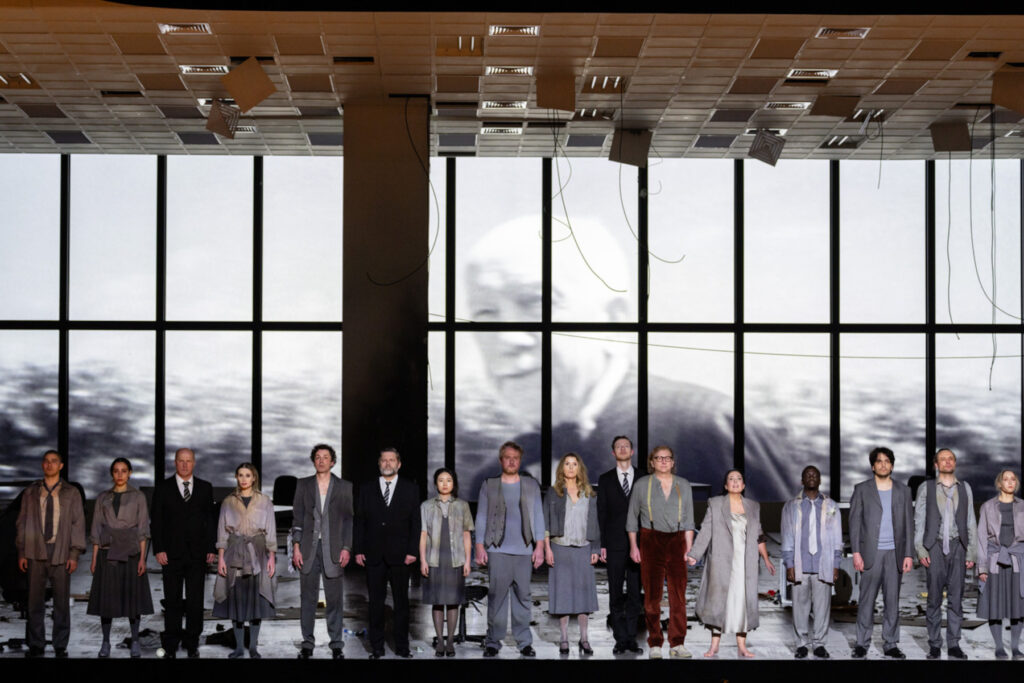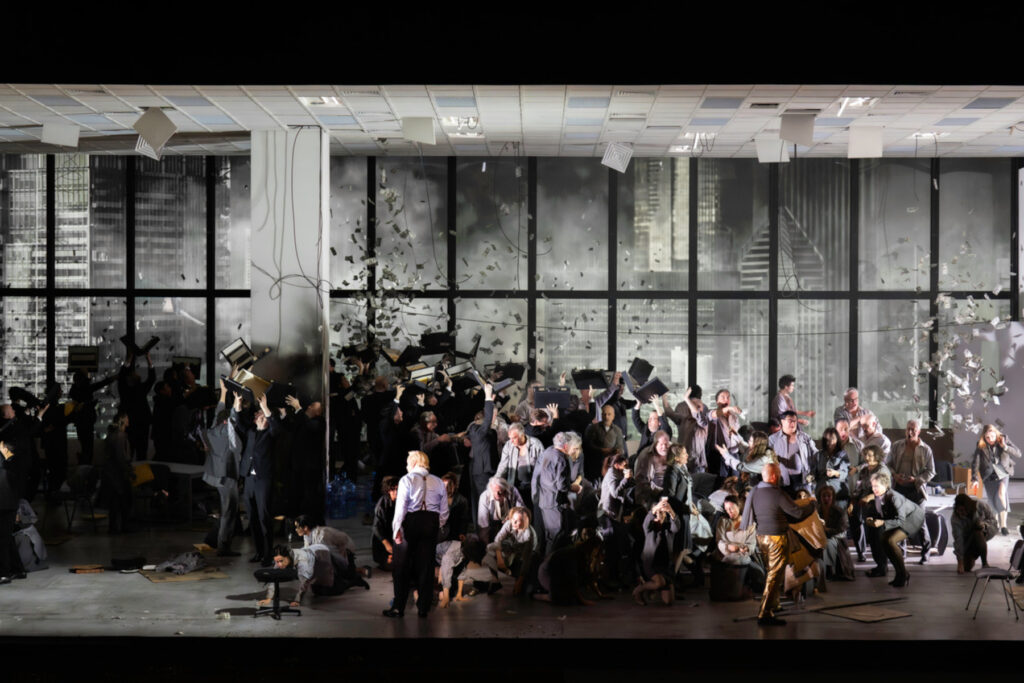For what continues to be considered an ill-fated rarity, Die Liebe der Danae has had several outings over the past couple of decades or so. I have seen three productions before this, two admittedly at its Salzburg Festival ‘home’ and none in Britain, though Garsington staged it a little before my time in 1999. (A recording, under the late Elgar Howarth, remains available.) Claus Guth’s Munich production, first seen earlier this season in February, is the Bavarian State Opera’s fourth. Rudolf Hartmann directed it twice; his first, 1953 version travelling on a company visit to the Royal Opera House, which has neglected to present it since. Hartmann’s 1967 production was designed by Jean-Pierre Ponnelle, no less, whilst 1988 saw a new version from Giancarlo del Monaco. With Rudolf Kempe, Joseph Keilberth, and Wolfgang Sawallisch conducting respectively, some of those occasions will surely have been fondly recalled by some in the Munich audience this time around. Nearly forty years on, though, it was time for something new. Perhaps ironically for an opera concerned in part with the baleful influence of gold, little expense would seem to have been spared. I wish, then, I could have felt greater enthusiasm, especially prior to the third act, for what I saw—and to some extent heard.
Guth’s production opened before the work with Danae posing for a photo shoot. Following a number of poses and loud clicks, the music could begin. The action played out exclusively in a penthouse with views of skyscrapers and the odd helicopter (as when Midas arrives). Pollux was dressed as a caricatured Donald Trump, silly hair, red tie, and overweight. His first appearance was enough to elicit laughter, which is fair enough: it was, for once, an amusing joke, but that was it really. Nothing was done with the identity beyond a love (common to all characters, it would seem) for the crass vulgarity of dictator-chic gold. That may have been a cause for relief given the impending shower of gold and indeed the question of Pollux’s relationship with his daughter Danae, but it ultimately seemed a bit cheap. (Perhaps that was the point.) And so, it continues, golden appearance clearly a sham, although the particularly trashy get-up of Jupiter as Midas is not without unfortunate connotations of Jimmy Savile, at least to a British viewer.

For the third act, everything changed—as, in a way, it should. The bubble had burst, though the physical devastation suggested war rather than a ‘mere’ credit crunch. (One might well argue that the two cannot be so readily separated. Indeed. But that probably needs to be shown rather than merely assumed or elided.) The drama that apparently truly interested Guth – up to a point, one cannot blame him – could commence in these new circumstances and one could actually begin to relate to the characters. In that, Guth’s conception was seemingly matched by a more committed performance from conductor Sebastian Weigle. They were doubtless following prevailing opinion; faced with the proverbial revolver to the head, who would not preserve the final act over the preceding two? But we are not—and perceived or actual imbalance is surely all the more reason to ask how we might elevate the latter. I am sure no one intended to reinforce (relative) critical opprobrium, but the first act in particular came across as often merely expository and, worse, expository of things that did not appear to have much in the way of consequence later on. If there was in Guth’s case unquestionably a guiding intelligence to the whole, contrast of ‘before’ and ‘after’ very much the thing, a little more sense of why we might care about these people and the situation they were in would have done no harm.
Did we need, though, Juno to wander around above the stage without doing anything of obvious import? Having that higher level was not a bad way of emphasising difference between gods and humans—and of showing in which guise Jupiter should be understood at which time. Yet beyond that, I ended up regretting Strauss had not written a part for the goddess, perhaps in wry homage to Handel’s Semele, which, given his profound knowledge of all manner of musical history, he must have known. Merkur’s dancing above – that of everyone else too – is best forgotten, suffice to say that, having tried his hand at choreography, Guth would be well advised to stick to the day job.

If it was interesting and in itself moving to see at the close film of old Munich and its wartime destruction, and of Strauss walking in his garden, presumably at Garmisch, they nonetheless suggested a certain abdication of responsibility. Danae was written for Salzburg, not Munich, and never received its full premiere in Strauss’s lifetime precisely because he wished it to take place across the reinstated border. Whilst we can look for traces of the composer in the work, it is also not obviously ‘about’ him, even a fictionalised him. It is not Intermezzo and it is not obviously laced with one of Strauss’s greatest musicodramatic gifts: irony. In the end, though, the story had been clearly enough told, as it has been on all occasions I have seen the work—and this was in every way preferable to the unconcealed racism of Alvis Hermanis for Salzburg in 2016.
To my surprise, Weigle proved less flexible than he had in an excellent reading at Berlin’s Deutsche Oper in 2016. If orchestral playing was more or less beyond criticism in itself – and the conductor doubtless merits some credit for that, but it was difficult to avoid the Bayerische Staatsorchester would have played with exemplary clarity, balance, and heft no matter what. The problem, rather, lay with Weigle’s reluctance or inability to let the score flow. Especially earlier on, too much emerged as unrelentingly loud. There is extraordinary variegation in the score, much of which had been more successfully presented in Berlin—and it needs a helping hand or two to draw it out. The difference may have been in part a matter of acoustics, but it is surely part of the conductor’s job to deal with that. I cannot recall feeling quite so bludgeoned in the Nationaltheater before. The third act, like Guth’s, was considerably more successful. Earlier on, lack of Straussian sweep tended to draw attention to the infelicities of Joseph Gregor’s libretto: something a fine performance can readily have one forget.

Volume issues extended to some singing too; again, this was surely at least in part Weigle’s task to moderate. As Midas, Andreas Schager was particularly in need of some restraint. Schager is, of course, an extraordinary Heldentenor. It seems churlish to cavil, given long years we endured when no one could sing Siegfried and few if any could master other Wagner roles. Here, he proved indefatigable as ever and also showed himself perfectly capable of softer, more sensitive singing in the third act. A little more shading elsewhere would nonetheless have been welcome. Another near-impossible role, arguably more so, is that of Jupiter, in which Christopher Maltman’s recent forays into heavier roles, Wotan included, fully justified themselves. Maltman despatched the lower, darker reaches of the role, movingly indeed and with echoes of the latter god’s farewell to Brünnhilde, whilst attaining rich and ringing clarity at the top, to suggest an almost Kaufmann-like tenor. In the title role, Malin Byström proved agile, fearless, and – important, this – rather likeable. Hers may not be the largest of voices, but she knew what to do with it and did it well. Smaller roles were all well taken, as were the choruses. Special mention should go to the quartet of ‘elder’ ladies, amusingly portrayed in sex-and-shopping mode and beautifully sung by Sarah Dufresne, Evgeniya Sotnikova, Emily Sierra, and Avery Amereau.
As for my reservations, perhaps it is time to accept that this is a very difficult work to bring off. Not every attempt will be entirely successful, any more than it is with, say, Der Rosenkavalier or Salome. Passing slowly yet surely into the repertoire would not be the worst of things, far from it.
Mark Berry
Die Liebe der Danae
Composed by Richard Strauss
Libretto by Joseph Gregor
Cast and production staff:
Jupiter – Christopher Maltman; Merkur – Ya-Chung Huang; Pollux – Vincent Wolfsteiner; Danae – Malin Byström; Xanthe – Erika Baikoff; Midas – Andreas Schager; Four Kings – Martin Snell, Bálint Szabó, Paul Kaufmann, Kevin Conners; Semele – Sarah Dufresne; Europa – Evgeniya Sotnikova; Alkmene – Emily Sierral Leda – Avery Amereau; Four Watchers – Bruno Khouri, Yosif Slavov, Daniel Noyola, Vitor Bispo; A Voice – Elene Gvitishvili; Bayerische Staatsopernchor (chorus director: Christoph Heil); Bayerische Staatsorchester; Sebastian Weigle (conductor)
Director, choreography – Claus Guth; Set designs – Michael Levine; Costumes – Ursula Kudrna; Lighting – Alessandro Carletti; Video – rocafilm; Dramaturgy – Yvonne Gebauer, Ariane Bliss
Nationaltheater, Munich, 19 July 2025
All photos © Bayerische Staatsoper